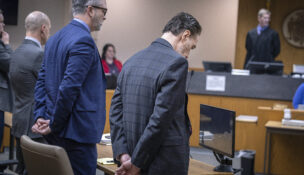Justices hear arguments on totality-of-evidence standard, Miranda custody
By: Michaela Paukner, [email protected]//September 14, 2020//
Justices hear arguments on totality-of-evidence standard, Miranda custody
By: Michaela Paukner, [email protected]//September 14, 2020//
The Wisconsin Supreme Court is deciding whether an incarcerated person is per se in custody for Miranda purposes in one of its latest cases.
The justices heard oral arguments in State v. Brian L. Halverson on Monday morning.
In July 2016, Halverson was accused of stealing and destroying several documents, and he was detained in the Vernon County Jail. The investigating police officer called Halverson at the jail and questioned him for three to four minutes about the destroyed documents.
The officer told Halverson who he was and why he was calling, but he didn’t threaten Halverson or give him a Miranda warning. During the call, Halverson admitted to destroying the documents, and he was subsequently charged with criminal damage to property and misdemeanor theft.
Halverson moved to suppress all evidence obtained from the phone call, arguing that because he was in jail, the officer was required to inform Halverson of his Miranda rights.
Chippewa County Circuit Court Judge Steven Cray granted Halverson’s suppression motion, and the State appealed. The Court of Appeals reversed the decision, concluding that the U.S. Supreme Court’s decision in Howes v. Fields effectively overruled the per se custody rule from State v. Armstrong.
The appellate court followed Howes’ totality-of-the-evidence standard, a two-part inquiry in which courts analyze the circumstances surrounding the interrogation, and determined that a reasonable person in Halverson’s situation would have felt comfortable ending the phone call.
Halverson appealed that decision, and the state Supreme Court is now reviewing the case. The justices are considering if incarceration automatically produces Miranda custody under the Wisconsin Constitution and if the circumstances around Halverson’s interrogation put him in Miranda custody.
Attorney Megan Sanders-Drazen appeared for Halverson during oral arguments on Monday. She said she knew it’s rare for the state Supreme Court to extend protections under the Wisconsin Constitution, but it’s necessary in this case.
“The justices of this court have the independent power and obligation to interpret the Wisconsin Constitution and to decide what protections are required under that Constitution for the people of this state, ” Sanders-Drazen said. “Yes, a contradiction with Howes v. Fields, but a contradiction that’s warranted under the circumstances.”
Attorney Sarah Burgundy, who appeared for the State, said when the Wisconsin Supreme Court found expanded protections in the Wisconsin Constitution in the past, the protections didn’t contradict U.S. Supreme Court law. Rather, they added an additional layer of protection.
“It wasn’t saying we completely disagree with the Supreme Court,” Burgundy said. “It was saying we see these gaps, and we want to fill these gaps. To contradict the Supreme Court would be kind of a big step for this court to take.”
Burgundy also pointed to the totality-of-the-circumstances test for Halverson’s phone call. She said other courts have uniformly said phone calls don’t create Miranda custody, and the test covers protections for incarcerated individuals.
Sanders-Drazen argued that Miranda is a Constitutional rule, but one that requires a prophylactic warning to protect the right against self incrimination.
“I think a realistic look at the pressures that go along with incarceration when combined with the inherently compelling pressures of police interrogation demonstrate that a prophylactic warning is critical in this context to provide meaningful protection to the right against self incrimination,” Sanders-Drazen said.
Burgundy agreed with defining Miranda as a Constitutional rule, but said she thought Sanders-Drazen’s argument went too far.
“If prison has such inherently compelling pressures on a prisoner, I think it’s going to be difficult to say that anything that a prisoner says, even with Miranda warnings, is voluntary under the Goodchild (totality of the circumstances) analysis,” Burgundy said. Follow @“WLJreporter”
Legal News
- Former Trump staffer who said to ‘fan the flame’ after 2020 loss hired to lead Wisconsin GOP
- Gov. Evers appoints David Casey to Serve as DOR Secretary
- FBI launches criminal investigation into Key Bridge collapse
- Man charged in slaying after woman’s leg found at Milwaukee-area park
- Minnesota man guilty in fatal stabbing of teen on Wisconsin river, jury finds
- Wisconsin teen sentenced in bonfire explosion that burned at least 17
- Wisconsin man who broke into home, ate victim’s chicken, slept in victim’s bed, receives prison and jail sentences
- Judge refuses to dismiss Hunter Biden’s gun case
- House passes reauthorization of key US surveillance program after days of upheaval over changes
- Milwaukee Police officer traveling to Georgia training retires before facing discipline
- Evers to ask legislature to approve largest increase in state support for UW System in two decades
- 7th Circuit Court of Appeals proposes new rules
WLJ People
- Power 30 Personal Injury Attorneys – Russell Nicolet
- Power 30 Personal Injury Attorneys – Benjamin Nicolet
- Power 30 Personal Injury Attorneys – Dustin T. Woehl
- Power 30 Personal Injury Attorneys – Katherine Metzger
- Power 30 Personal Injury Attorneys – Joseph Ryan
- Power 30 Personal Injury Attorneys – James M. Ryan
- Power 30 Personal Injury Attorneys – Dana Wachs
- Power 30 Personal Injury Attorneys – Mark L. Thomsen
- Power 30 Personal Injury Attorneys – Matthew Lein
- Power 30 Personal Injury Attorneys – Jeffrey A. Pitman
- Power 30 Personal Injury Attorneys – William Pemberton
- Power 30 Personal Injury Attorneys – Howard S. Sicula











